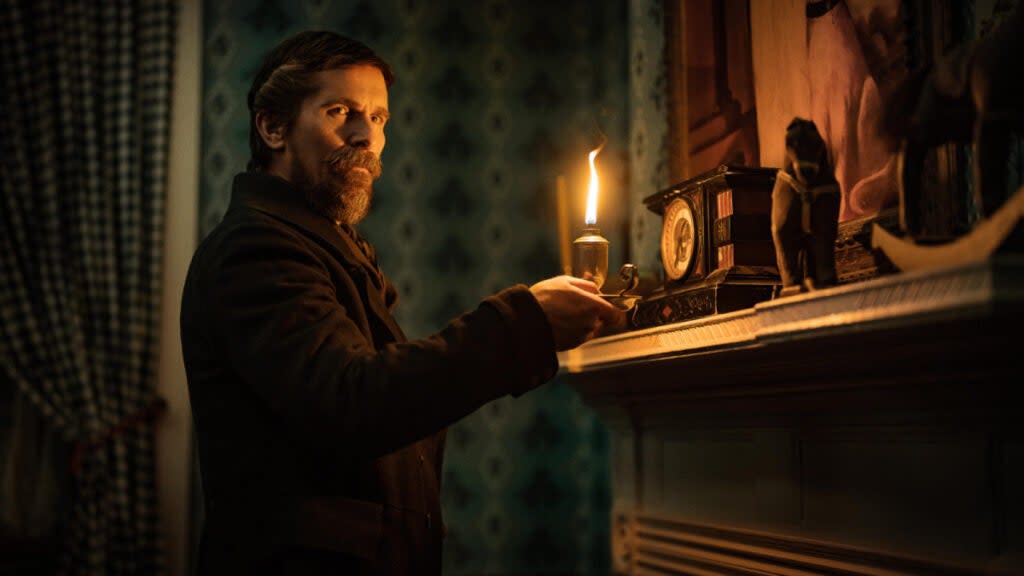‘The Pale Blue Eye’ Review: Murder Mystery Puts Young Edgar Allan Poe on the Case

- Oops!Something went wrong.Please try again later.
- Oops!Something went wrong.Please try again later.
Every year it seems like there’s a handful of weird cinematic coinky-dinks, like how 2022 managed to give us three “Pinocchio” movies, two unrelated Disney blockbusters about underwater blue people, and three ensemble comedy whodunits with blink-and-you’ll-miss-it theatrical releases. But perhaps most specific of all, and sneaking in right under the wire, is the new microgenre of films about a young Edgar Allan Poe solving murders while he was a cadet at West Point.
Following in the footsteps of Christopher Hatton’s stylish but troubled “Raven’s Hollow,” Scott Cooper’s “The Pale Blue Eye” tells the story of a mysterious murder and mutilation at the famous military academy. Christian Bale plays a retired detective, Augustus Landor, who gets called forth to investigate the crime, and along the way he allies himself with the unusually sensitive and erudite Mr. E. A. Poe, played by Harry Melling (“Please Baby Please”), who somehow seems destined for bigger, macabre-ier things.
Edgar Allan Poe was not just, as MC Lars once put it, “America’s favorite anti-transcendalist,” but his tale “The Murders at the Rue Morgue” also also helped define the detective genre as we know it, nearly half a century before the creation of Sherlock Holmes. With an authorial resumé consisting of some of the most iconically ghoulish short stories ever told, like “The Pit and the Pendulum” and “The Cask of Amontillado,” the temptation to place Poe himself into the very situations he wrote about is undeniably appealing, even if it can’t help but feel like fan fiction.
Cooper is one of the more self-serious directors of his generation, and he isn’t terribly invested in geeking out over Poe’s celebrity by overtly referencing his greatest hits. There’s at least one shot of a raven in here, sure, and Augustus Landor is a minor treasure trove of in-jokes — Poe’s influential detective was named “C. Auguste Dupin,” and the author’s final short story was “Landor’s Cottage” — but for the most part, “The Pale Blue Eye” works whether or not you’re intimately familiar with Poe’s writings.
Elegantly photographed by Masanobu Takayanagi (“Swan Song”), Cooper’s film pulls you in with its gothic atmosphere and quiet intensity. It seems as though there are horrors hanging in the air, all around Landor and Poe, and for the longest time it’s uncertain whether the ominous foreshadowings in Cooper’s screenplay (adapted from the novel by Louis Bayard) will bear supernatural fruit.
It’s unfortunate that the central mystery has few genuine suspects, and that astute viewers may be able to get well ahead of both Landor and Poe as they rummage through all the clues and conspiracy theories. Fortunately, even if you think you know who dunned it, and even if you’re right, the real treat is losing yourself in Cooper’s thick and eerie world and getting to know the fascinating characters all the better.
Bale makes for a quiet and intense detective, and the actor seems keenly aware that as soon as Edgar Allan Poe enters the movie, Landor has no choice but to step out of the spotlight. That spotlight, however, is where Harry Melling belongs. An excellent and exciting actor, Melling captivates as the soft spoken, kind-hearted, somewhat egotistical amateur poet. Poe sees in Landor an opportunity for someone of comparable intelligence to finally recognize his own greatness. And his eagerness to impress, combined with his own inexperience and emotional frailty, makes Poe a wonderfully odd character to follow, whether he’s got a famous name or not.
The investigation finds Landor and Poe spying further and further into the family of Dr. Marquis, played by Toby Jones. Gillian Anderson steals many a scene as Mrs. Marquis, and Lucy Boynton (“Chevalier”) is alluring and mysterious as the woman who steals Poe’s heart, and whose name sounds just enough like “Lenore” that it’s probably-almost-definitely not a coincidence. Charlotte Gainsbourg and Robert Duvall round out the cast, as characters who exist for no particular reason other than to provide important exposition, but it’s a detective story — someone’s gotta do that — and Gainsbourg and Duvall do it beautifully.
“The Pale Blue Eye” is the best movie yet made about Edgar Allan Poe solving Edgar Allan Poe mysteries. That’s no enormous feat — even Lewis McTeigue’s pulpy early entry in the subgenre, the 2012 serial killer film “The Raven,” was a bit of a clunker — but this is meant as genuine compliment. Scott Cooper has directed a film with a gimmicky premise but genuine dramatic weight, anchored by handsome filmmaking and striking performances. Harry Melling is certainly accumulating one wonderful calling card after another, but his performance in “The Pale Blue Eye” has a tasteful thickness to it. He’s ever so slightly larger than life, but in that self-defeating way that makes his performance seem familiar and real.
“The Pale Blue Eye” is now streaming on Netflix.

